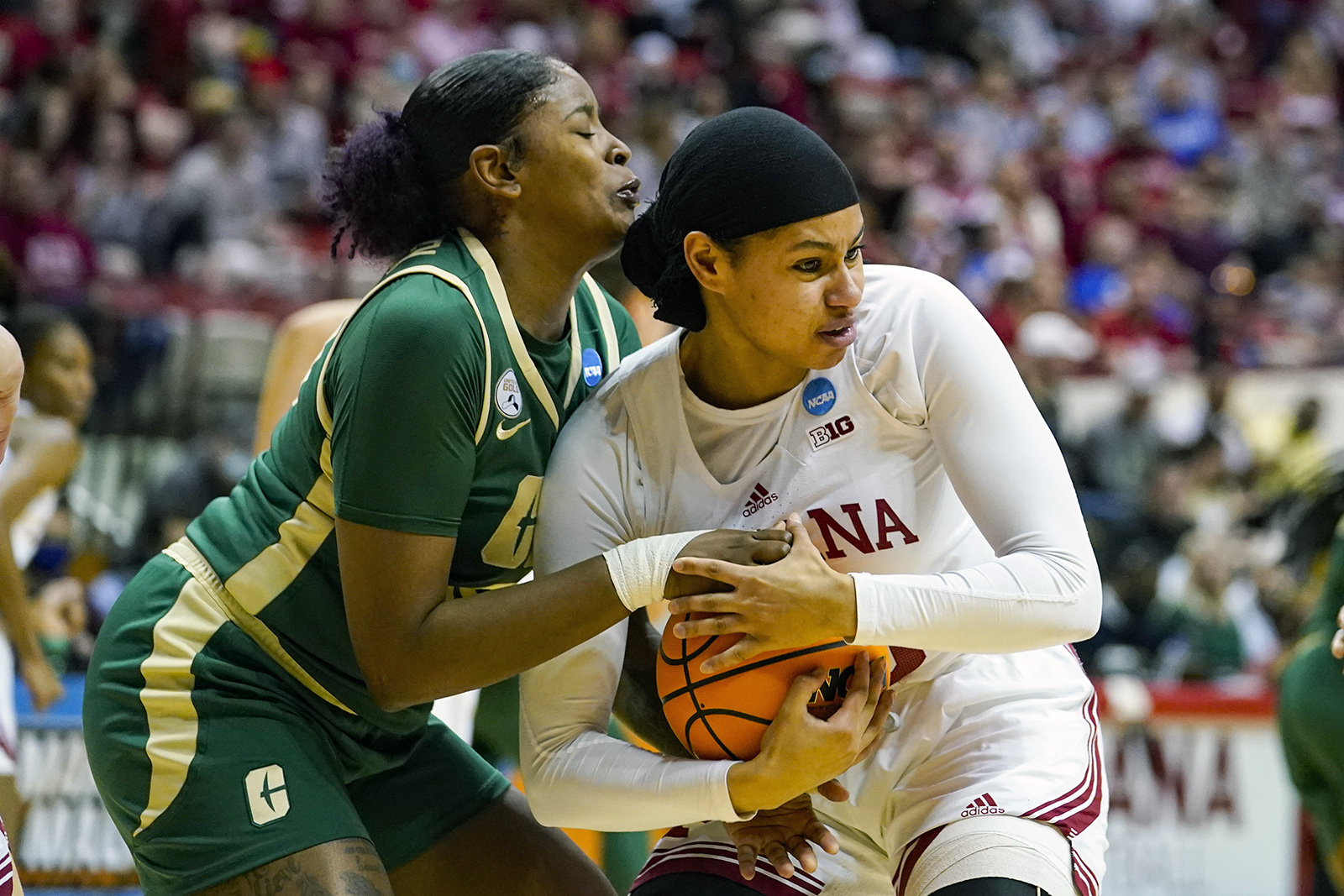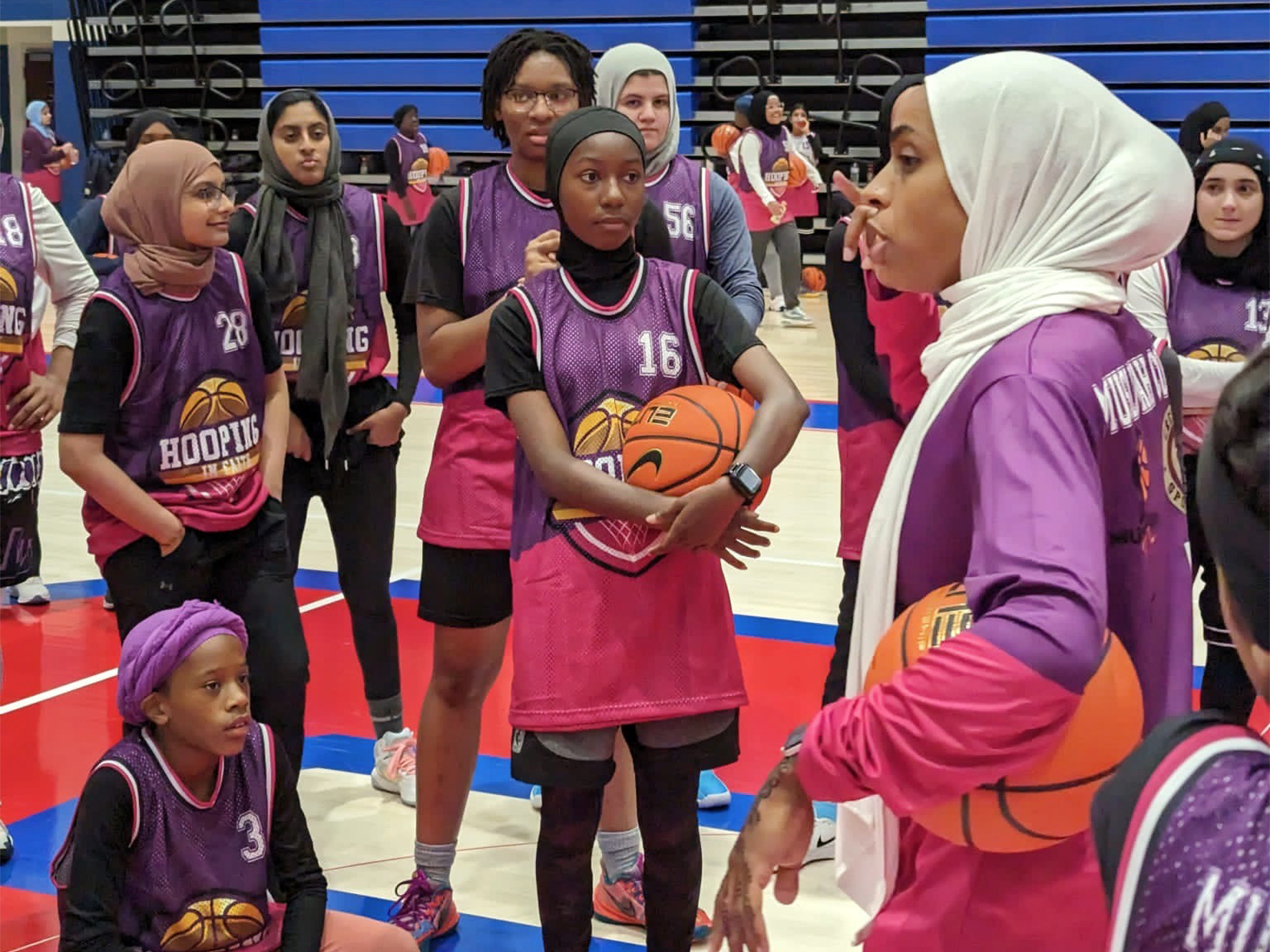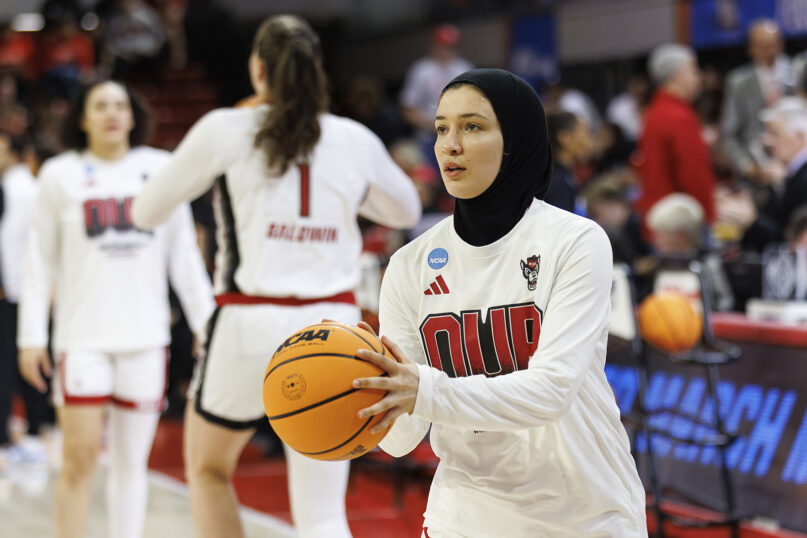(RNS) — The thrill of it will never get old for me: seeing Muslim women, especially Muslim women wearing hijab, playing sports, in school, amateur level or professionally. As the NCAA and WNIT women’s basketball tournaments come down to their final days, women are out there doing their thing while visibly Muslim, like it’s no big thing.
Except that it kind of is.
While many fans are focused on the elite-level skills of college players such as the University of Iowa’s Caitlin Clark or Louisiana State University’s Angel Reese, I’ve loved seeing five Muslim women basketballers (that I know of) join the Big Dance this year (during Ramadan, no less) and leave it all out there on the court.
Diaba Konaté is a 23-year-old senior at University of California, Irvine, whose No. 13 seed team lost in the first round of the NCAA Tournament to No. 4 seed Gonzaga, ending her college basketball career. Konaté, who hails from France, cannot play basketball in her home country due to French laws banning hijab in sport and other sectors of French life. But she will return home having helped take UCI to its second NCAA Tournament appearance in the program’s history and as a Big West tournament champion.
On Friday (March 29), in the NCAA women’s round of 16, Amina Muhammad, a sophomore from DeSoto, Texas, at the top-seeded University of Texas at Austin, will be meeting Gonzaga, while Jannah Eissa, a hijab-wearing freshman with the No. 3 seed North Carolina State Wolfpack, will be playing against No. 2 seed Stanford University. Eissa, who hails from Cairo, is the first hijab-wearing competitor to play in the Atlantic Coast Conference.
Over in the WNIT tournament, the University of Buffalo, where senior Rana Elhusseini plays, lost to Monmouth in the first round. Monmouth then lost to Duquesne in a nail-biting game that saw a few minutes’ action from senior Kiandra Browne. The Canadian Browne transferred to Duquesne last year from Indiana University, where she had converted to Islam in her freshman year and started wearing hijab as a sophomore.

Indiana forward Kiandra Browne, right, gets tied up by Charlotte forward KeKe McKinney, left, in the first half of a college basketball game in the first round of the NCAA Tournament in Bloomington, Ind., March 19, 2022. (AP Photo/Michael Conroy)
I managed to catch Browne before her second of two daily practices this week and asked her how it was to play in hijab at such a fast-paced tournament level. “Honestly, it’s no big deal for me,” she said. “This is who I am, a take-it-or-leave-it kind of thing. My team is used to it, my coaching staff is used to it. I don’t get any pushback from my team.”
These matter-of-fact statements are exactly what thrills former college player Bilqis Abdul-Qaadir, who had her eyes on entering the WNBA in 2014. But when she didn’t make it in, she decided to aim for international play, only to be barred from that due to International Basketball Federation’s then-rule that didn’t allow for headgear. “I had to reidentify who I was after the ban,” she said.
Abdul-Qaadir joined the #FIBAAllowHijab campaign, and by 2017 the federation had changed its rules to allow head coverings in international competition. Along with her husband, she now serves as athletic director at the Islamic Association of Greater Memphis, while acting as a mentor and friend to any Muslim hoopster or athlete seeking support.
“I know all (of these players) except for Amina,” Abdul-Qaadir told me. Browne played for Abdul-Qaadir’s old coach at Indiana, who reached out to Abdul-Qaadir after Browne converted to Islam so she could have some support. Abdul-Qaadir knows how important it is for these athletes to have someone who understands their lives and their love of the sport. “I randomly reach out to Muslim athletes … to check in on them. I’m tired of fighting rules; I’m trying to create our own spaces. We need to be supporting each other.”

Bilqis Abdul-Qaadir, right, talks to players during a Hooping in Faith basketball program in July 2023 in Memphis, Tenn. (Photo by Fathima Darboe)
Like me, Abdul-Qaadir is beyond excited to see five Muslims playing in these postseason tournaments. “When I played, I was the only one (in hijab). I never made it to the NCAA Tournament, but I made it to the WNIT twice. It may seem like a small thing, but it’s not.”
I wondered if there would ever come a time when Muslim women (wearing hijab or not) playing college or professional hoops would be a nonstory, a no-big-deal kind of a thing.
Abdul-Qaadir, who has been ensconced in basketball life for years, doesn’t think so. “I honestly don’t. … It’s still so new to anyone outside of Muslim communities. I don’t think it’ll ever be normalized until we see teams full of Muslim women, wrapped or otherwise.”
And while players who wear hijab are most visibly Muslim, Abdul-Qaadir was quick to remind me that “we don’t know everyone’s stories. You don’t know about women who don’t wear hijab but are Muslim. Their stories are also important to tell. It literally brings me to tears when I see my sisters out there playing, and they’re winning.”
As for Browne, while she doesn’t personally know all her fellow Muslim women players, she follows them all on social media and sends them prayers. “It’s not always the easiest thing to be doing this,” she said. “We’re the only ones who really understand what each other is going through. We respect each other.”
There’s something to be said for a sisterhood of support, that nod of the head you give someone with whom you share some part of your identity — that “I see you” moment. It makes what are already exciting basketball tournaments that much more fun.
(Dilshad D. Ali is a freelance journalist. The views expressed in this commentary do not necessarily reflect those of Religion News Service.)





